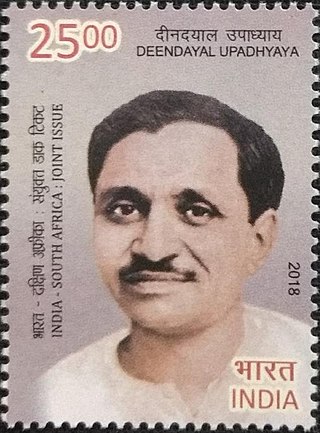Related Research Articles

Chaudhary Charan Singh, better known as Charan Singh was an Indian politician and a freedom fighter. Singh was principally known for his land and agricultural reform initiatives. He briefly served as the prime minister of India from July 1979 to August 1979 and was Member of Parliament (MP) for Baghpat. During prime ministership he was a member of the Janata Party (Secular). He served as 5th Chief Minister of Uttar Pradesh as a member of Bhartiya Kranti Dal. He also briefly served as deputy prime minister of India from January 1979 to July 1979 as a member of the Janata Party. Singh is widely regarded as the "Champion of farmers", after his life has been dedicated to advocating for the wellbeing and rights of farmers.

The Janata Party is an unrecognized political party in India. It was founded as an amalgam of Indian political parties opposed to the Emergency that was imposed between 1975 and 1977 by Prime Minister Indira Gandhi of the Indian National Congress. In the 1977 general election, the party defeated the Congress and Janata leader Morarji Desai became the first non-Congress prime minister in independent modern India's history.

Samyukta Socialist Party, was a political party in India from 1964 to 1974. SSP was formed through a split in the Praja Socialist Party (PSP) in 1964. In 1965, Ram Manohar Lohia merged his Socialist Party (Lohia) with SSP and contested in 1967 Indian general election. In 1972, SSP was reunited with PSP, forming the Socialist Party. But in December 1972, SSP was recreated after the split in Socialist Party. One faction of SSP led by Madhu Limaye and George Fernandes wanted to merge with PSP but another faction led by Raj Narain resisted the merger with PSP.

Bharatiya Lok Dal was a political party in India. The BLD or simply BL was formed at the end of 1974 through the fusion of seven parties opposed to the rule of Indira Gandhi, including the Swatantra Party, the Samyukta Socialist Party, the Utkal Congress and the Bharatiya Kranti Dal. The leader of the BLD was Charan Singh.
Virendra Kumar Sakhlecha was an Indian politician who served as the 10th Chief Minister Of Madhya Pradesh from 18 January 1978 to 19 January 1980. He was a leader of the Bharatiya Janata Party. He hailed from Mandsaur district.

Raj Narain was an Indian freedom fighter and politician. He won in a famous electoral malpractice case against the then Prime Minister Indira Gandhi, which led to her disqualification and imposition of the Emergency in 1975. He defeated Gandhi during the 1977 Lok Sabha elections.

Ram Prakash Gupta was Chief Minister of Uttar Pradesh, and Governor of Madhya Pradesh. He was a leader of Bharatiya Janata Party, as well as its predecessor party, the Bharatiya Jana Sangh.
Chandra Bhanu Gupta served three terms as chief minister of Indian state of Uttar Pradesh. In 1970s he was a member of Congress (O) and Janata Party.
Govind Narayan Singh, was an Indian politician. He was Chief Minister of Madhya Pradesh from 30 July 1967 to 12 March 1969. He was also Governor of Bihar state from 26 February 1988 to 24 January 1989.
The Janata Morcha was a coalition of Indian political parties formed in 1974 to oppose the government of Indian Prime Minister Indira Gandhi and her Congress (R) party. The coalition was an integral part of the popular movement against the Emergency rule of Indira Gandhi and the direct predecessor of the Janata Party, which defeated the Congress (R) in the 1977 Indian general election to form the first non-Congress government in independent India. It was formed by Jayaprakash Narayan and Morarji Desai, chief of the main opposition Congress (O) party.

Deendayal Upadhyaya, known by the epithet Panditji, was an Indian politician, a proponent of integral humanism ideology and leader of the political party Bharatiya Jana Sangh (BJS), the forerunner of Bharatiya Janata Party (BJP). Upadhyaya started the monthly publication Rashtra Dharma, broadly meaning 'National Faith', in the 1940s to spread the ideals of Hindutva revival. Upadhyaya is known for drafting Jan Sangh's official political doctrine, Integral humanism, by including some cultural-nationalism values and his agreement with several Gandhian socialist principles such as sarvodaya and swadeshi (self-sufficiency).
Abbas Ali was an Indian freedom fighter and politician who was a captain in the Indian National Army led by Subhas Chandra Bose. Later he joined the Socialist movement and was a close associate of Ram Manohar Lohia.

Bharatiya Janata Party, Rajasthan is a state unit of the Bharatiya Janata Party in Rajasthan. Madan Rathore is the current president of the BJP Rajasthan, succeeding Chandra Prakash Joshi who served the position from 2023–2024. Vasundhara Raje was the previous Chief Minister of Rajasthan during 2013–2018, previously she served in the same post from 2003 to 2008. She was the first female Chief Minister of Rajasthan. And the former president of the BJP Rajasthan.
Conservatism in India refers to expressions of conservative politics in India. Conservative-oriented political parties have included the Bharatiya Janata Party, the Congress Nationalist Party, and the Uttar Pradesh Praja Party. In addition, a number of figures within the Indian National Congress, such as Sardar Vallabhbhai Patel were conservative.
Elections to the Madhya Pradesh Legislative Assembly were held in February 1967. These were the elections to the legislative assembly having 296 seats in undivided Madhya Pradesh. Govind Narayan Singh was elected to the assembly as an Indian National Congress candidate but soon rebelled against the incumbent Chief Minister, Dwarka Prasad Mishra and resigned from the Congress party. He formed a new political party, known as the Lok Sewak Dal and became the Chief Minister of Madhya Pradesh as the leader of a coalition, known as the Samyukta Vidhayak Dal.
Lokdal or Lok Dal is an Indian political party based on agriculture policies, founded by former prime minister of India Charan Singh. It was founded on 26 September 1979 by merging Janata Party (Secular), Socialist Party (Limaye) and Orissa Janata Party. Charan Singh was elected president of Lok Dal and Raj Narain, its working president.
1967 Fourth general elections held in Uttar Pradesh. The Indian National Congress won the most seats as well as the largest share of the popular vote. But it could not secure enough seats for a majority and so a coalition of other parties formed the government with Charan Singh as the Chief Minister of Uttar Pradesh.
An election was held in 1969 to elect members to the Bihar Legislative Assembly, the lower house of the legislature of the Indian state of Bihar. After the elections, the Congress emerged as the largest party, and Harihar Singh was sworn in as the Chief Minister of Bihar. Three parties contested in a 'Triple Alliance'; the Loktantrik Congress Dal, the Praja Socialist Party and the Samyukta Socialist Party. The Triple Alliance divided 295 out of 318 constituencies between them, assigning 23 seats to the Communist Party of India.

Mohan Lal Verma was a leader of Indian independence movement and a lifelong follower of Mahatma Gandhi. After independence he was appointed as MLC - Member of the State Legislative Council from Hardoi constituency from 1948 to 1952. After this tenure he also served the district of Hardoi for a decade as MLA- Member of the Legislative Assembly for two consecutive terms from 1957 to 1967. He won his first MLA election from Sandila constituency in 1957 and again in 1962 from erstwhile Gondwa constituency. Even after his political career he continued to serve the people of Hardoi and bring development to the district until his death.
Ugrasen Singh was an Indian politician and freedomfighter. He was a Member of the Uttar Pradesh Legislative Assembly Barhaj Assembly constituency won in 1967 Uttar Pradesh Legislative Assembly election. He also served as the Member of Lok Sabha from Deoria Lok Sabha constituency in 1977.
References
- ↑ Aditi Phadnis (2009). Business Standard Political Profiles of Cabals and Kings. Business Standard. ISBN 9788190573542 . Retrieved 7 April 2013.
- "Madhya Pradesh political crisis: Jyotiraditya Scindia joins BJP". The Hindu. 10 March 2020. Retrieved 21 January 2021.
- Kaveree Bamzai (13 January 2014). "Why 2013 is not 1967". India Today. Retrieved 21 January 2021. - ↑ Rajesh Ramachandran (24 October 2013). "The Third Front myth". The Hindu Business Line. Retrieved 21 January 2021.
- Prafull Goradia (7 July 2019). "One nation, one poll". The Statesman. Retrieved 21 January 2021. - ↑ "Chaudhary Charan Singh, India's 6th PM, first non-Congress CM of UP". The Indian Express. 9 February 2022. Retrieved 17 February 2023.
- ↑ Brass, Paul R. (2014). An Indian Political Life: Charan Singh and Congress Politics, 1967 to 1987 - Vol.3 (The Politics of Northern India). SAGE India. p. 7. ISBN 978-9351500322.
- ↑ Brass, Paul R. (2014). An Indian Political Life: Charan Singh and Congress Politics, 1967 to 1987 - Vol.3 (The Politics of Northern India). SAGE India. pp. 10–12. ISBN 978-9351500322.
- ↑ Brass, Paul R. (2014). An Indian Political Life: Charan Singh and Congress Politics, 1967 to 1987 - Vol.3 (The Politics of Northern India). SAGE India. pp. 12–13. ISBN 978-9351500322.
- 1 2 3 "Chaudhary Charan Singh, India's 6th PM, first non-Congress CM of UP". The Indian Express. 9 February 2022. Retrieved 17 February 2023.
- 1 2 Brass, Paul R. (2014). An Indian Political Life: Charan Singh and Congress Politics, 1967 to 1987 - Vol.3 (The Politics of Northern India). SAGE India. p. 14. ISBN 978-9351500322.
- ↑ "HT This Day: Feb 18, 1968 -- Charan Singh quits as CM". Hindustan Times. 16 February 2022. Retrieved 17 February 2023.